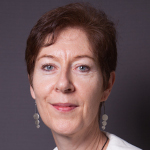A Letter from Dean Barrett
Before I had unpacked my books or met the faculty in The College of Liberal Arts and Sciences, before classes had begun and students returned to transform a beautiful campus into a vibrant one, I discovered that LA&S was sponsoring a guest lecture by Bill McKibben, author, environmentalist, and activist. I had nothing to do with making this happen; kudos go to the editor of this newsletter, Despina Williams Parker, former Interim Dean Stella Deen, Dr. Brian Obach, Department Chair of Sociology, members of the World Affairs Council, a generous donation from alumnus Howard Goldblatt and his wife, Leila Goldblatt, as well as many other involved in the planning and implementation. Over 600 people, many of them students, attended that lecture and several buses transported students, faculty, staff, and community members to New York City for the largest climate march in history. I am thrilled to be a part of an institution with so much energy and commitment. Here, the teacher-scholar model is heightened by engagement with local and global issues; faculty research energizes the classroom experience as students develop their skills in labs and fieldwork, in archives and libraries, all culminating in provocative and significant discussions and events.

The confluence of the McKibben lecture and an editorial in The New York Times, “Demanding More From College,” has shifted my attention from the mundanity of unpacking the many boxes we moved from Savannah and the sublimity of hiking in the Mohonk Preserve back to an issue that has preoccupied me for several years: the increasing emphasis on workforce preparation in higher education. The author of the editorial, Frank Bruni, argues compellingly about the “potential – and need – for college to confront and change political and social aspects of American life that are as troubling as the economy.” Of course, college provides paths to success. Connections between college degrees and financial well-being are well documented, and, as tuition rises, graduate job placement is more important than ever. Less quantifiable is how college affects its graduates and society in immaterial ways. Bruni goes on to say that “college can establish patterns of reading, thinking and interacting that buck the current tendency among Americans to tuck themselves into enclaves of confederates with the same politics, the same cultural tastes, the same incomes.” College should prepare students to live examined lives. The good – and perhaps surprising – news is that some of the seemingly “less practical” majors do a remarkable job of preparing students for careers as well, and as AAC&U has noted, the salaries of students who graduated with liberal arts majors often surpass those with more vocational degrees by mid-career.
I take great pride in being part of SUNY New Paltz and the College of Liberal Arts and Sciences, a community of educators committed to mentoring students on their paths to be thoughtful, engaged, and productive citizens who care about the world, both immediate and distant, and who will find success in their careers and their lives. As I look out the window at a spectacular landscape (more colorful than those I’ve seen in my sixteen years in the South), I look forward to watching the progress of seasons and students.
